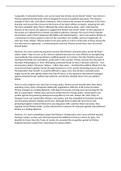A plausible, if ultimately flawed, case can be made that Wolsey served himself ‘better’ than Henry in
that he implemented domestic reforms designed to ensure his political supremacy. The clearest
example of this is the 1526 Eltham Ordinance, which reduced the number of Gentlemen of the Privy
Chamber and secured the removal of the Groom of the Stool, William Compton, replacing him with
the more complaint Henry Norris. Although this reform did serve Henry ‘well’, reforming the
finances of the council, this appears to suggest that Wolsey was served ‘better’ by this upheaval of
the system as it allowed him to bolster his political authority. Likewise, the Court of Star Chamber
served Henry well in that it dispensed affordable and impartial justice – but it was used by Wolsey as
a mechanism to enforce greater control of the councillors, the nobility, and local magistrates. As
John Guy notes, Wolsey ‘offered justice to the poor partly in order to strike back at those among the
rich who were his opponents’, corroborating the view that Wolsey served Henry well, but served
himself better.
However, the more convincing argument remains that Wolsey’s domestic policy served the king’s
wishes ‘better’ than his own, as the reforms implemented were far more effective in strengthening
royal authority than advancing Wolsey’s political agenda. For instance, the Star Chamber ensured
that Royal Authority was maintained, particularly in the counties. Wolsey oversaw the execution of
the Duke of Buckingham in 1521, eliminating a potential threat to Henry’s dynastic authority – thus
serving Henry better. Moreover, Wolsey – rather than Henry – absorbed the political fallout from the
controversial fixed subsidies forced through Parliament in 1523, further illustrating how he served
the king better than himself. It would be difficult to argue, then, that Wolsey’s domestic policy
largely served his own agenda rather than that of Henry, as the repressive mechanisms leveraged
against potential threats upheld royal authority, and Wolsey shielded Henry from any political
fallout.
There is some weight to the view that in foreign policy, Wolsey served himself better than Henry,
operating at the centre of England’s diplomatic negotiations. With the 1518 Treaty of London,
Wolsey emerged as a leading diplomat, reflecting his Humanist learning and even earning him the
title of ‘papal legate’. Wolsey thus seemed to eclipse Henry in foreign policy, advancing his own
pacifist agenda and garnering widespread recognition for his role. Indeed, the 1526 Treaty of
Hampton Court was named after Wolsey’s own palace, and also embodied his Humanist learning,
securing peace between England and France. Although these treaties did serve Henry well,
protecting England’s national interest by securing peace with countries where necessary, they
arguably served Wolsey better, as they allowed him to advance his humanist agenda and positioned
Wolsey as a leading diplomat.
However, it is more compelling to argue that Wolsey’s foreign policy were more oriented towards
the king’s wishes, as they were directed towards the fulfilment of Henry’s desire for glory. The
benefits for Henry from the Treaty of London far exceeded the recognition gained by Wolsey:
England had been isolated from mainstream European politics,




